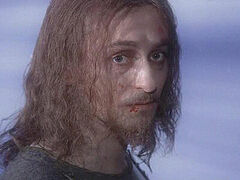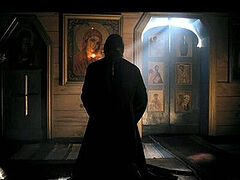I met with Archpriest Valerian Krechetov, rector of the Church of the Protection of the Theotokos in the village of Akulovo of the Odintsovo district near Moscow and a well known spiritual father, to reflect on current events, and the spiritual giants he has known throughout his long service in Christ’s Church.
—Fr. Valerian, whenever I meet with you, I have the feeling that in fact nothing terrible is happening around us, that life is going on as usual. And I cannot but recall the biblical words that there is no new thing under the sun (Eccles. 1:9), everything in the world goes on as it did before...
—Yes, life is stormy now. But it is necessary to participate in it in an appropriate way, even for our generation... I often hear the statement that time has now shortened a little—by about one third. That is why we often “don’t have enough time”. But this resonates with what is said in the Gospel: but for the elect’s sake those days shall be shortened (Mt. 24:22). That is, these days are called “the end times” in the Holy Scriptures. “The end times” is a very loose concept in terms of both spirituality and time. Even the Apostle John once wrote: It [the antichrist] should come; and even now already is it in the world (1 Jn. 4:3). Of course, he spoke about the forerunners of the Antichrist. But with the Lord… a thousand years as one day (2 Pet. 3:8), so a completely different time passes in the spiritual realm!
Here on earth it passes according to daily and other cycles. It is also true that its speed changes. Indeed, even modern scientists note some new weather signs and climate changes.
I also sometimes note some things for myself. Although I don’t have a TV set and I don’t use the internet, I have heard about cybernetics, on which everything is based today. I know who the founder of this science is, how it is developing, but I also remember the time when cybernetics was considered a pseudoscience: I was then a student, so it was in my memory. At that time we had a wonderful teacher, and I remember his words: “Philosophers say that our scientists are bad philosophers. But it appears that our philosophers are not learned enough!” He drew attention to a different angle.
Therefore, what is happening and what has happened in the world is very interesting. There is a Chinese greeting: “May you live in an era of changes!” This is a wish to live in an interesting time. But here I mean such an “interesting time” when you can’t make out anything, you can’t understand anything.
—Even from the politicians’ point of view, our time is so paradoxical that it can be astonishing! A simple example: Four years ago, the United States accused Russia of interfering in the American presidential elections. But what is happening with the US elections today? It’s just a disaster!
—You see, spiritual people looked at all these processes, both secular and political, from a different perspective. In particular, Fr. Nikolai Guryanov. The Lord vouchsafed me to be in contact with this elder. In the final years of his life I would come to give him Communion. Elders are all very sweet, surprisingly bright and joyful. And they often say very significant things quietly. Once a man came to him and asked whether he should stay in Russia or return to the United States. The elder said to him: “Well, choose yourself: Russia is already on its Golgotha, and America is gone!” These were his words. I asked him: “Father, which country is next?” He replied, “First America, then France, Germany...” The sequence is like this. Why am I saying this? Because I personally heard these words. We often hear statements, supposedly quotes from spiritual elders. But not everything is conveyed correctly, so information can be biased. And here I myself testify that the conversation went like that.
In fact, what is happening in the world now is happening for one main reason—a spiritual reason.
There is a wonderful work—very short, but precise and clear—by St. Nikolaj (Velimirovich) of Serbia, entitled, “War and the Bible”. In the form of a dialogue, he clearly explains what and how is happening in the world today. And there is only one possible conclusion: The cause of everything is spiritual!
Even before him, St. Ambrose of Optina said similarly: “Look at everything ‘from the other side’—then everything will fall into place.” In fact, St. Nikolaj (Velemirovich) directly revealed the following idea: When a people (or their ruler, or both taken together) begins to behave in such a way that God’s longsuffering ceases for a time, then calamities or wars are sent to earth. When people begin to take life more seriously, repent of their sins and return to God, everything gets back to normal.
The Lord said these words to the Apostle Peter, but this applies to all of us: What I do thou knowest not now; but thou shalt know hereafter (Jn. 13:7). We are not greater than St. Peter! Now we look back and see: first atheism began, then the Russian Revolution followed, then the wars...
In fact, the question of the Revolution is a complex one. What was the Revolution in Russia like? It was in fact a coup! In actual fact, we didn’t have a revolution! True, it had been prepared, and the preparation went on for more than a century. St. Seraphim of Sarov spoke about this: “There will be a revolution in Russia, and a bloody war will follow.” Many of our spiritual elders warned about these things—they said that if things continue as they have, all of this would happen in Russia. And it really happened!
I was personally honored to serve together with Archpriest Sergey Orlov.1 He graduated from seminary in 1911 and then became interested in revolutionary ideas. But this is typical for youth... Although his father asked him to follow the spiritual path, he wanted knowledge and a concrete, quick “transformation of life.”
—I have always wondered: What was lacking in Russia then? What needed to be “transformed urgently”? What transformations did life need then?
—What transformations? This started back in the days of Alexander Pushkin. There is the famous work by Alexander Radishchev entitled, Journey from St. Petersburg to Moscow. But Pushkin, in his turn, wrote a similar work, which is never spoken of: Journey from Moscow to St. Petersburg. Analyzing Radishchev’s work, he wrote: “It seems that the author of this work is trying to irritate the higher authorities with his malicious words. Wouldn’t it be better to tell us how clever landowners should do something?” Unfortunately, scoundrels are always around us. Pushkin also noted that the author denounced censorship. But censorship is also an ambiguous matter. What is it guided by? Because “the unprintable” is actually a terrible thing. In conclusion Pushkin said that in that case [if it were something worthy of publication.—Ed.] the work wouldn’t have caused a stir, but would have been beneficial. And then Pushkin made a truly Patristic remark: “There is no credibility in reproaches and there is no truth where there is no love!”
 Fr. Sergey Orlov and Fr. Valerian Krechetov in Akulovo, 1974. The point is that there were deliberate attempts to embitter the nation. The Decembrists2 began to do this... It was said that they “exposed shortcomings”. However, spiritual eyes look not at shortcomings, but at merits. The Lord created man in His own image. That is why the Holy Fathers always tried to highlight these features of the image of God.
Fr. Sergey Orlov and Fr. Valerian Krechetov in Akulovo, 1974. The point is that there were deliberate attempts to embitter the nation. The Decembrists2 began to do this... It was said that they “exposed shortcomings”. However, spiritual eyes look not at shortcomings, but at merits. The Lord created man in His own image. That is why the Holy Fathers always tried to highlight these features of the image of God.
It is said that the Lord doesn’t see evil. The Fathers say: “A sign of purity of heart is not seeing sin.” The righteous man sees no sin! This is why the wonderful biblical example is given to us of when God came to Abraham and said: Because the cry of Sodom and Gomorrah is great, and because their sin is very grievous; I will go down now, and see whether they have done altogether according to the cry of it, which is come unto Me (Gen. 18:20). The All-Seeing and Omniscient God said: “I will see if this is so”! Thus He teaches us not to lightly believe every single word people say.
Unfortunately, people began to believe everything at once. For example, they accepted reproaches made against the royal dignity and believed that the State system in Russia was imperfect. But in general, if you look at it, the system as such practically doesn’t change. There are always good people and bad people. And whether people are called landowners, bourgeoisie or capitalists (they pinned all sorts of labels on people) is not so important! Tsars and presidents are very different as well. We know that there are even all sorts of bosses.
So, people paid attention to flaws. But they are a very serious thing. Why? Because a person enters into a struggle with sin.
Human shortcomings are sins. These sins are nurtured by passions. Take the Gospel teaching when the Lord says: Why beholdest thou the mote that is in thy brother’s eye, but considerest not the beam that is in thine own eye? (Mt. 7: 3). What is this? A “beam” (log) is a trunk, and a “mote” [which can also mean a twig, a small bough in Russian.—Trans.] is what grows from the trunk.
Therefore, we see manifestations of passions. The “trunk” is passion and the “mote” (bough) is sin. We only see a manifestation, but no one knows what a person lives by; he himself doesn’t really know. We should be eradicating specific passions. If you cut off the boughs, the tree dries up, even if it has roots.
Boughs are often covered with leaves. And this reflection is very interesting, because in fact a tree without leaves doesn’t bear fruit. But the leaves are the outward aspect (we call it, “the ritual side”); they are superfluous. But without the leaves there can be no fruit! Therefore, the main thing is inside, although one is inseparable from the other.
—It is said that a spiritual person judges everything spiritually (cf. 1 Cor. 2:15). But our society wasn’t entirely spiritual. As a rule, simple people looked only at their neighbors’ vices, without separating the person from his sin.
—Quite right! The whole point is that the “dissection” of the human personality is a rather artificial thing. Because man has become so close to and amazingly merged with the spiritual realm! We don’t often think about the words of the prayer: “For the repulsion of every tempting thought and action of the devil which works spiritually in my fleshly members” (prayer 5 of St. Basil the Great in the prayers of preparation before Holy Communion). We don’t often notice this “devil’s action”, but if we look carefully, we will see very much of it. Over the years, I began to notice that while doing something, we can suddenly get caught up and fall.
Remarkable evidence is given in the excellent book by Fr. Konstantin Rovinsky3 entitled, Notes of an Old Priest. A wonderful work. For some reason it isn’t widespread here, although I recommend it to everyone, especially to priests.
— I recently found this book on a book stall, so I’ll read it with interest.
—Yes, the fact is that it relates his observations of the movements of the dark forces of evil. The author notes that with observation he began to understand that many actions were suggested to him by someone. At first he was just annoyed, but then he turned to spiritual people—to Fr. Isaiah, Elder Aristokly’s cell-attendant, and then to Fr. Alexei Mechev. They gave him a very interesting answer: “Yes, surely these powers exist. But there is no need to annoy them—relations with them should be correct.” In my opinion, they put it very well! Because this is their job! If they don’t do this, they will be “unemployed”.
By the way, an interesting analogy has crossed my mind. Fr. John (Krestiankin) said about this: “What can one person do here? Surely he can do nothing!” In fact, all this is orchestrated by the same “conductor” who heads this whole crowd of “performers”—all these fashions, trends and hobbies.
For example, take monuments to the “leader of the Revolution” [Lenin] standing everywhere, often with his arms outstretched. When I once mentioned Lenin in a conversation with Fr. Sergei Orlov (he graduated from Warsaw University and Kiev Polytechnic Institute—he had two higher educations—and after the war he also graduated from the Theological Academy), he suddenly said: “Who is he?” I was shocked: “How is it that you’re asking who he is?! He’s the ‘leader of the world proletariat’—everyone knows him!” And he suddenly said to me: “He is nobody! I was in the midst of the revolutionary events, and no one knew that man!” This is an example for you that the coup wasn’t prepared by Lenin. True, he was later “put into power”, but he didn’t even stay in power for long—though that’s another question.
So our rulers are mere executors of the paths of Divine Providence. Of course, their will is also present in what happens around us. But how is it embodied? If, for example, a “stick” is needed, he embodies his will as a “stick”. If a “whip”, then as a “whip”. If a “shovel” is needed, then as a “shovel”. In fact, each ruler is not very original and is even rather weak.
Remarkable in this sense is the Gospel example when the Lord—beaten, blood-stained and in the Crown of Thorns—stood before Pilate. And Pilate said to Him: Speakest Thou not unto me? knowest Thou not that I have power to crucify Thee, and have power to release Thee? (Jn. 19:10). And the Lord answered him: Thou couldest have no power at all against Me, except it were given thee from above (Jn. 19:11).
—Which was instantly confirmed.
—The most interesting thing is that when this passage from the Gospel is read in church, the following verses are omitted. And here is the continuation of this event: Pilate left and signed the decision: “to crucify.” Though he had earlier wanted to release Him!
To be continued.







